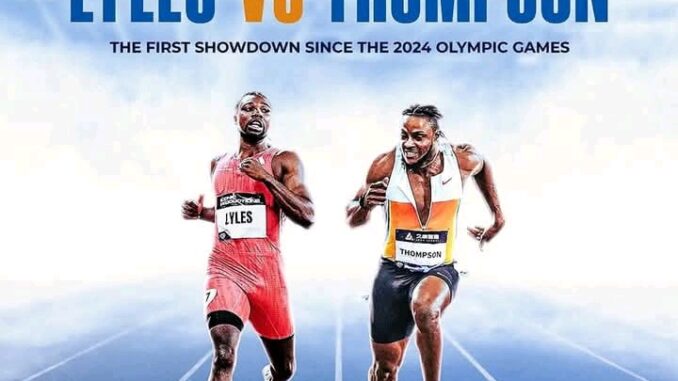
Track nightmares: When a Good Starter Meets a Master Finisher: Thompson vs Lyles,
When a good starter and good finisher meet, who will come out on top? 🤔
Kishane Thompson 🇯🇲 is known for his explosive start and powerful acceleration phase, often gaining a noticeable lead in the first 60 meters.
Noah Lyles 🇺🇸, on the other hand, is a master finisher — his top-end speed and ability to maintain velocity through the last 40 meters sets him apart. He might trail early but closes the gap with a lethal drive phase and finish. See full details..
Their clash at the Paris 2024 Olympic Games produced one of the most gripping 100-metre finales in recent memory—a vivid demonstration of two distinct sprinting styles colliding at the highest level.
Kishane Thompson: The Thunderous Start
Jamaican sensation Kishane Thompson has made a name for himself with explosive starts and a powerful acceleration phase. In the lead-up to Paris, Thompson electrified the track with a personal best of 9.77 seconds at the Jamaican trials in June 2024—a world-leading mark at the time and a jaw-dropping announcement of his ascending threat on the global stage .
Internally, he expressed how the showdown with Lyles sharpened his focus. After clinching that world-leading time, Thompson credited the Olympic duel as a key motivator, saying it “gave me a high boost of motivation… I’m really confident” .
Thompson’s 60-metre indoor form also underpins his explosive profile. In early 2025, he began the year with a blistering 6.48 seconds in Kingston, followed by a win in Astana at 6.56 seconds—clear evidence that his start phase remains elite .
Noah Lyles: The Lethal Finisher
American superstar Noah Lyles is celebrated for his ability to maintain and intensify velocity in the latter stages of a sprint. Early in the race, he may trail behind, but his top-end speed coupled with superior speed endurance often turns the tide.
In Paris, Lyles’ start was uncharacteristically sluggish—but in the drive phase and beyond, his speed endurance shone. Detailed split breakdowns show that Thompson led through the first 60 metres. But by 80 and 90 metres, Lyles was closing in, culminating in a photo-finish gold where he edged Thompson by just five-thousandths of a second, crossing the line in 9.784s to Thompson’s 9.789s .
Curiously, as journalist Josina Anderson explained, Lyles’ victory wasn’t luck—it stemmed from his slower deceleration. His consistent speed in the final phase meant he overtook athletes who were fading—making his acceleration profile deceptive and lethal .
Lyles also leaned on psychological preparation. Time magazine revealed he followed a meticulously designed mental routine—visualizations, breathing, and mental scripting—that kept him composed and focused during the race, especially in the closing meters .
Paris 2024: A Race for the Ages
The men’s 100m final in Paris cemented this rivalry in history. Both athletes clocked 9.79 seconds, but Lyles’ torso finish secured the gold by the thinnest margin—0.005 seconds—making it one of the slimmest victories ever and a testament to precision technology and nerves of steel .
This final was also remarkable for its collective speed—all eight finalists broke the 10-second barrier, making it one of the fastest and closest Olympic 100m finals ever .
So, Who Comes Out on Top?
In Paris, the narrow victory went to the finisher—Noah Lyles. His strategy of conserving energy early and unleashing speed late proved just enough to surpass Thompson’s early lead.
But make no mistake: Kishane Thompson’s explosive start pushed Lyles to the brink and forced a performance that will define Lyles’ legacy.
Looking Ahead: Tokyo 2025 and Beyond
Fast forward to 2025. Thompson has improved—dramatically. At the Jamaican National Championships, he blasted a world-leading 9.75s, becoming the sixth-fastest man ever and firmly establishing himself as the man to beat .
He’s taken the Olympic duel as a learning experience and used it as fuel—a mindset that could pay dividends in battles to come .
Lyles, meanwhile, retains unmatched championship pedigree—Olympic gold and multiple world titles across 100m, 200m, and relays . His closing speed and mental resilience remain his greatest weapons.
Prediction: It’s Still Too Close to Call
If Thompson maintains that explosive early speed and sharpens his finish, especially in rounds and finals, he could dominate what we’ve dubbed “the 60-metre phases” and stay ahead longer.
If Lyles continues to leverage his endurance, mental game, and top-end speed, he’ll remain the favourite in photo-finish scenarios.
Their rivalry promises thrilling races ahead—especially if they meet again at the Tokyo 2025 World Championships.
Conclusion: In the showdowns of 2024, the master finisher (Noah Lyles) emerged victorious—but just barely. As we look ahead into 2025, the explosive starter (Kishane Thompson) has the form and mindset to overturn that result. The battle between start and finish is far from over—and for sprint fans, that’s the best kind of suspense.
Leave a Reply